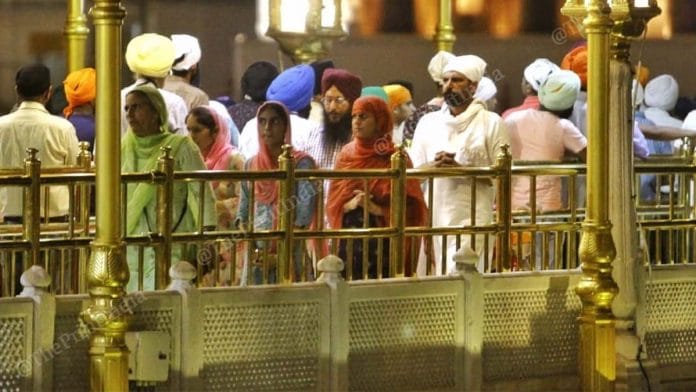New Delhi: Six months ago, Prime Minister Narendra Modi announced the nationwide lockdown, one of the strictest in the world, to combat the spread of Covid-19. Several restrictions have since eased to a great extent, with travel, malls, restaurants and bars opening up, and even metro services resuming.
However, India’s Covid crisis is far from over. The country has recorded more than 57 lakh cases and over 91,000 deaths, as of Friday. It currently has the world’s second-highest number of total and active cases, and the third-highest number of deaths.
Through the pandemic, teams of journalists from ThePrint have been travelling across India to bring you eyewitness accounts of how it is unfolding in the country, and how it has impacted the lives of people. This week, they bring you stories from Gujarat and Punjab.
Also read: Daily tests cross 10-lakh mark first time this week, India’s positivity rate dips to 7.4%
No public discipline in Rajkot, controversies dog hospital
With 7,643 cases and 123 deaths, Rajkot is behind only Ahmedabad and Surat in Gujarat’s Covid tally. Most of the cases were reported after mid-August, and many officials and Opposition leaders are blaming the spike on the lack of public discipline during Janmashtami festivities on 11 August and the huge rally conducted by the BJP after its new state president C.R. Patil was appointed.
Rajkot’s Municipal Commissioner Udit Agrawal told ThePrint’s Soniya Agrawal and Manisha Mondal, “This year all public places were shut down during the festival and public gatherings were restricted. Despite this, people resorted to visiting each other, this is something that we cannot monitor or control.”
Several opposition leaders in the state also alleged that the BJP’s five-day rally is to blame, but party spokesperson Rajubhai Dhruv deflected the charge. He told ThePrint, “It was never our intention to create such chaos in the city. We ensured that a limited number of people were invited. Citizens saw this as a joyous occasion to meet and greet their party representatives. Their zest and enthusiasm was natural after the grim period of lockdown and disease.”
Meanwhile, the city’s largest government medical facility, the Civil Hospital, is in the eye of not one but two storms in the midst of rising Covid cases. The first is a viral video showing the alleged physical assault on a Covid-19 patient by hospital staff. The patient died days after the assault, and his family said he died as a result of the attack, while the hospital claimed he was mentally unstable.
The second incident occurred when the family of a 70-year-old patient, who succumbed to Covid, was in the middle of performing his last rites and the hospital asked them to return the body as a post-mortem had not been conducted. The hospital has since sealed its main Covid wing. Read more about Rajkot’s battle against Covid here and here.
Also read: India’s R value drops below 1 for the first time since Covid pandemic struck
No Covid rules at Golden Temple, Ludhiana’s high mortality
ThePrint’s Aneesha Bedi and Praveen Jain, who have been travelling across Punjab for the past few days, found that there is a complete disregard for face masks, hand sanitiser and physical distancing at the Golden Temple in Amritsar, even though the management said all guidelines were being followed.
Health officials in Amritsar said while several meetings were held with the Shiromani Gurdwara Prabandhak Committee about wearing face masks at the gurdwara, all they could do is “request them since it is a statutory body”. Sewadars at the Golden Temple told ThePrint that they could not force anyone to wear a mask or sanitise their hands, but they would not stop anyone who wanted to. Read more here.
Meanwhile, the state government has overhauled the top administration of Patiala’s Rajindra Hospital and Government Medical College after reports of poor Covid management came to light — nearly one in every four Covid patients admitted to the hospital has died.
ThePrint also visited Punjab’s industrial hub of Ludhiana, which has recorded the highest number of Covid cases as well as deaths in the state. Its fatality rate of 4.1 per cent is well above the state’s average of 2.94 per cent and the national average of 1.62 per cent.
This is partly attributed to Punjab’s rich diet, which makes people vulnerable to comorbidities, and also to rumours that Covid testing is a front for organ trafficking, which has made people fearful of getting tested. The problem has been made worse due to Ludhiana’s poor healthcare infrastructure — neither of the city’s two government hospitals is equipped to deal with critically ill Covid patients, who have to be shifted to Chandigarh.
The Attari-Wagah border in Punjab is usually thrumming with crowds because of the famous Beating Retreat ceremony that takes place every evening between the Border Security Forces (BSF) on the Indian side and the Pakistani Rangers on the other side of the gate. On any regular day, there would be 10,000 people at Attari but the ceremony stands suspended now because of the pandemic. This has badly hit local businesses that sprang up in the area, including shopkeepers, dhaba owners, flag painters and all kinds of labourers.
Jashandeep Singh, a 25-year-old, earlier ran a garment shop at the border but is now in debt and has opened a juice stall. “I had no option. I borrowed money in the initial months but now we don’t know if things will ever be the same again so I have taken this shop on rent. Winters are approaching, and people like fresh juice,” he told ThePrint, adding that his daily income has dropped by more than half. Read more here.
Also read: 70% of Bihar’s TB control staff still on Covid duty as state records steep fall in diagnosis






